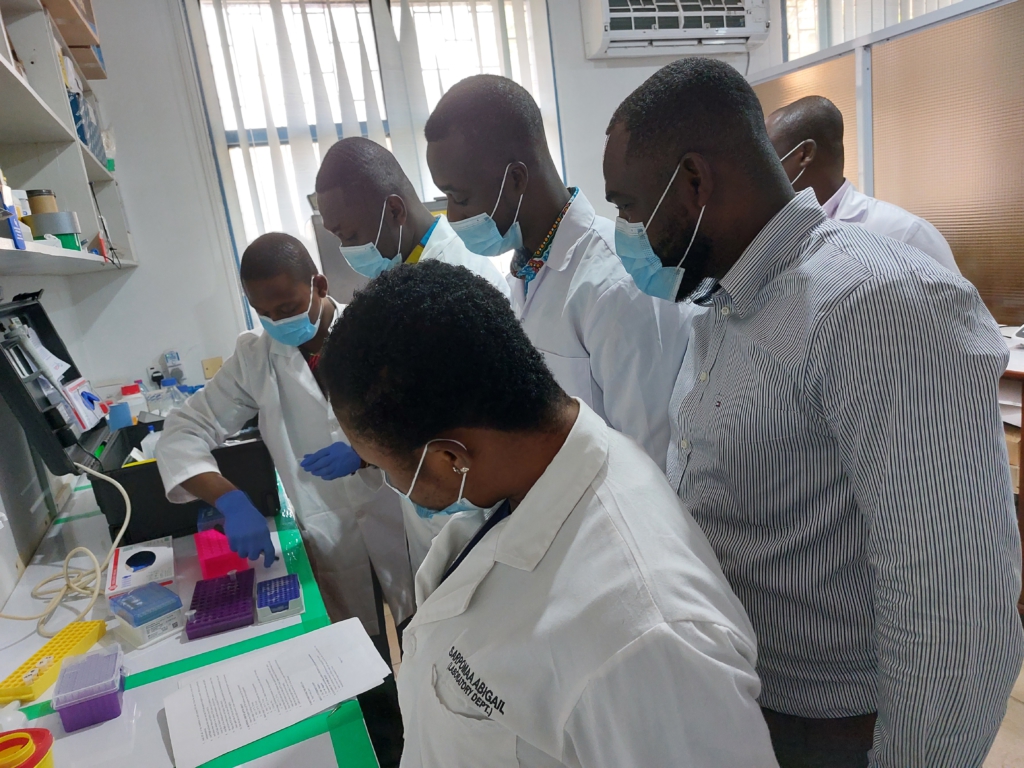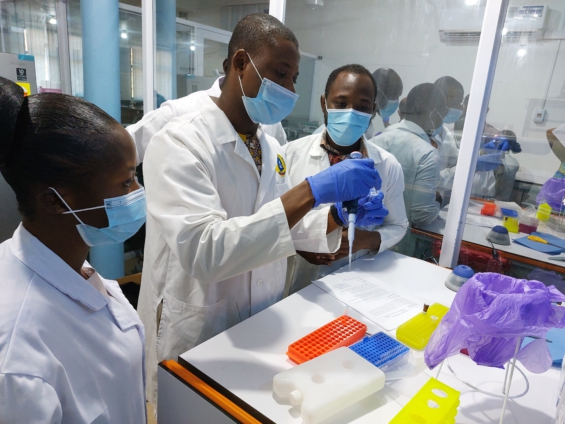The Department of Molecular Medicine of the Kwame Nkrumah University of Science and Technology (KNUST) together with Kumasi Hive Biolab, are working around the clock to locally develop Covid-19 test kits.
When fully developed and the Food and Drugs Authority (FDA) approves, covid-19 test kits will be affordable and easily accessible nationwide. The turnaround time for test results would also be reduced.
For now, the World Health Organisation (WHO) recommended technique for testing covid-19 is the reverse transcriptase quantitative polymerase chain reaction (qPCR) testing. This type of test is cumbersome, requires in-depth technical know-how, is time-consuming and requires specialised real-time machines. It is also very expensive due to the reagents or chemical components.
In looking for cheaper alternatives, UnternehmerTUM, a German company has partnered with Deutsche Gesellschaft fur Internationale Zusammenarbeit (GIZ) GmbH to implement the Lab for the Production of Test kits project. This project has been running since February 2021 and aims to develop affordable and effective covid-19 test kits locally.

A Senior Lecturer at the Department of Molecular Medicine and leading Scientist on the project, Dr Samuel Asamoah Sakyi, revealed that the “RT-Lamp assay employs colorimetric output, a colour change from red (negative) to green (positive). It is easy to do, inexpensive, and turnaround time is fast. This is the advantage the RT-Lamp assay has over the WHO recommended qPCR method of testing for SARS-CoV-2.”
The 500,000-euro project is in part funded by the develoPPP programme and implemented on behalf of the German Federal Ministry for Economic Cooperation and Development (BMZ). It is not only developing local covid-19 test kits but also training 100 biomedical scientists to equip them with knowledge and skill needed to run the tests.
So far, 40 Ghanaian biomedical scientists have been trained in the testing procedure which includes nasopharyngeal sample collection and extraction of RNA.
Dr. Samuel Asamoah Sakyi explained the importance of the project stating that “anyone would be able to do a simple procedure that can give you results comparable to that from any of the known testing centres irrespective of where you find yourself in Ghana.” He is happy that the trainees, most of whom had never extracted RNA or DNA before will be well equipped to do so.
A Biomedical Research Scientist, Samuel Kekeli Agordzo, who takes the trainees through the practical sessions said, “I am confident the participants will be able to replicate the RT-LAMP assay because most of our facilities do not have the qPCR which is expensive.” Participants hope to spread their newfound knowledge at their various places of work.
The Lab for the Production of Test kits project will not just reduce the burden on the few existing testing centres like the KCCR and Noguchi but ensure test kits are readily available and accessible in every corner of Ghana with biomedical scientists qualified to extract samples and test properly for accurate results.
Latest Stories
-
Dreams FC denies allegations of attempting to sign Najeeb Yakubu
30 mins -
Election 2024: ‘Right to free and fair elections non-negotiable’ – Akufo-Addo
36 mins -
Kurt Okraku took out my passport from the U23 squad that travelled to Japan – Najeeb Yakubu alleges
46 mins -
Where hope fails: Ghana’s decaying home for the destitute
56 mins -
NDC Mining Committee for 2024 campaign refutes allegations of recruiting thugs for elections
1 hour -
Traction Control: A lifesaver with an off switch? Here’s why it exists
1 hour -
I don’t need anyman to woo me with money – Miss Malaika 2024 winner refutes pimping claims
1 hour -
”Kurt Okraku sabotaged my national team career because I refused to sign with Dreams FC” – Najeeb Yakubu
1 hour -
Businesses urged to leverage Generative AI for enhanced customer engagement
1 hour -
MultiChoice Ghana partners with Ghana Hotels Association to elevate guest entertainment
1 hour -
Bawumia’s music streaming app or Mahama’s pay-per-view TV channel?
2 hours -
Karpowership Ghana empowers 40 Takoradi Technical University students with scholarship
2 hours -
We expect significant reduction in prices of petroleum products in coming weeks – CEO AOMC
2 hours -
Betway Africa offers once-in-a-lifetime ‘Play-on-the-Pitch’ experience at Emirates Stadium
2 hours -
I coined the term ‘hype man’ in Ghana – Merqury Quaye
2 hours

